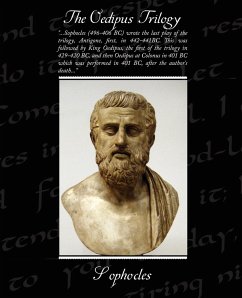Sophocles (496-406 BC) wrote the last play of the trilogy, Antigone, first, in 442-441BC. This was followed by King Oedipus, the first of the trilogy in 429-420 BC, and then Oedipus at Colonus in 401 BC which was performed in 401 BC, after the author's death. Because the plays were not written in chronological order there are some minor inconsistencies, but these do not detract from the worth of the plays. The blind prophet Teiresius foretells that Oedipus will unwittingly kill his own father, and then unknowingly marry his mother, with whom he will have four children. The three plays in this book, King Oedipus, Oedipus at Colonus and Antigone, show us what happens when Oedipus realizes what he has done. The Trilogy tells Oedipus's story from his birth through his life and the ramifications for his children.
Bitte wählen Sie Ihr Anliegen aus.
Rechnungen
Retourenschein anfordern
Bestellstatus
Storno








